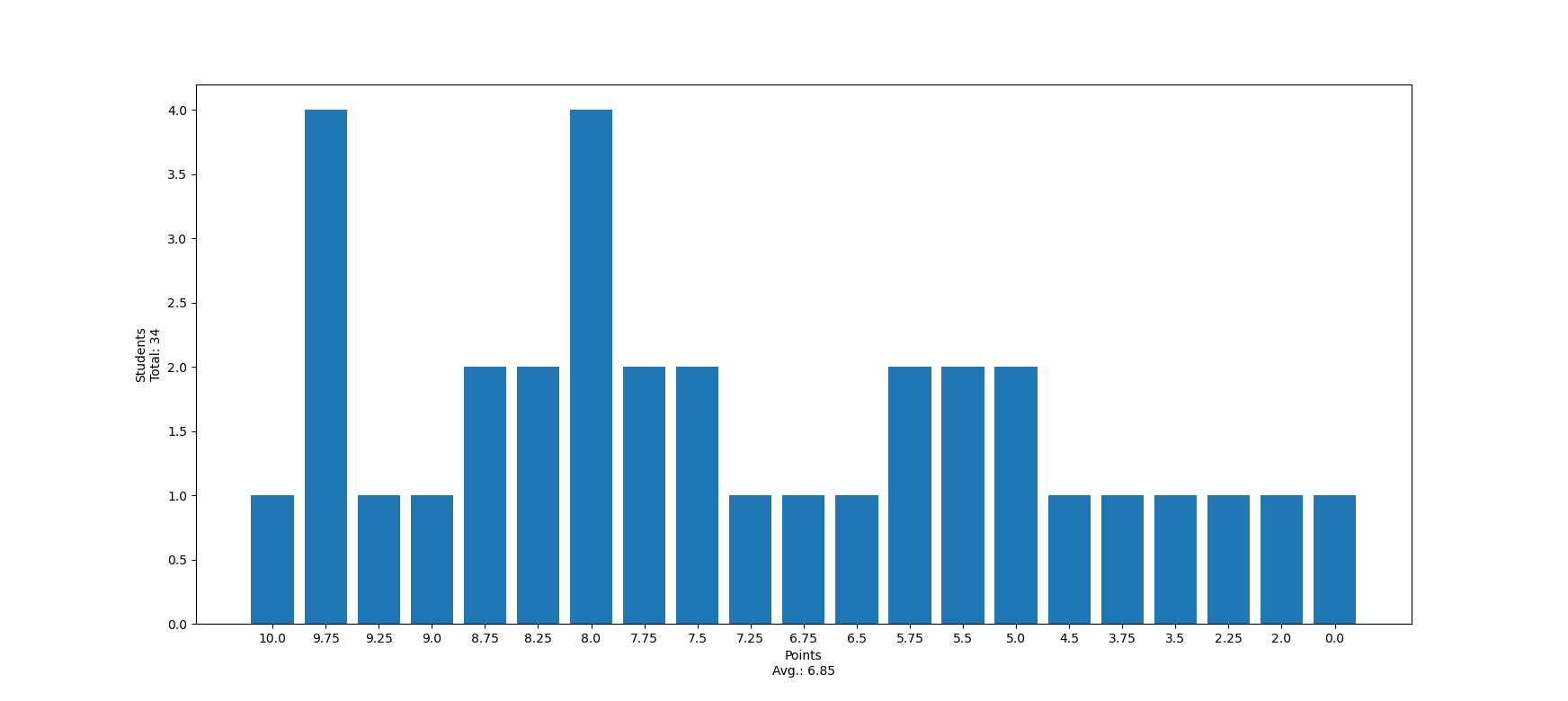Tutorium 05 - 17.11.2023
Korrektur Exercise-04
Punkteverteilung
Häufige Fehler
-
Type Annotations
-
Print-Statements, Top-Level Statements in Logik/nicht in
if __name__ == "__main__": assert # some test -
Ich kann euch prinzipiell immer 0 Punkte geben wenn Ihr etwas verwendet, was nicht Teil der Vorlesung war
-
Lest die Aufgabenstellungen/Hinweise auf dem Blatt
-
Benennt eure Dateien/Methoden richtig
Vorrechnen
lists.py- a)
even: no43 - b)
min: cl393 - c)
max: mt367
- a)
euler.py- a)
fac: au56 - b)
approx_e: rw208
- a)
binary.py- a)
to_num: ua28 - b)
stream_to_nums: md489
- a)
Exercise-05
- Abgabe Montag 09:00 Uhr im git
- Probleme beim installieren von
pygame?
Übungsaufgaben
Primes
Schreibe eine Funktion prime_factorization die eine Ganzzahl n entgegen nimmt und alle Primfaktoren berrechnet und die gegebene Zahl n in einen Paar mit den Primfaktoren als Liste zurückgibt. Denkt dabei an die richtigen Type Annotations
def prime_factorization(n):
pass
Dataclass
Schreiben Sie eine Datenklasse Fraction (Bruch), beachten Sie dabei die Type Annotations. Ein Bruch besteht aus einem divident und einem divisor.
from dataclasses import dataclass
@dataclass
class Fraction:
pass
Nun modellieren wir Hilfsmethoden für unsere Datenklassen, die uns später bei der Logik von Brüchen helfen
# the greatest common divisor of two numbers `a`, `b`
def gcd(a, b):
pass
# this shortens a fraction to its most reduced representation
def shorten_fraction(fraction):
pass
Abschließend modellieren wir nun auch noch das Verhalten von Brüchen indem wir Methoden direkt in der Datenklasse erstellen. Type Annotations!
# Multiplication of two fractions
# `Fraction(1 / 2) * Fraction(2 / 6) -> Fraction(1, 6)`
# Extra: make it possible to multiply `int` with a fraction
# `Fraction(1 / 2) * 2 -> Fraction(1 / 4)`
def __mul__(self, o):
pass
# The division of two fraction
# `Fraction(1 / 2) / Fraction(2 / 6) -> Fraction(3, 2)`
# Extra: make it possible to divide `int` with a fraction
# `Fraction(1 / 4) / 2 -> Fraction(1 / 2)`
def __truediv__(self, o):
pass
# The negative of a fraction
# `-Fraction(1 / 2) -> Fraction(-1 / 2)`
def __neg__(self):
pass
# The addition of two fractions
# `Fraction(1 / 4) + Fraction(2 / 8) -> Fraction(1 / 2)`
# Extra: make it possible to add `int` with a fraction
# `Fraction(1 / 4) + 1 -> Fraction(5 / 4)`
def __add__(self, o):
pass
# The subtraction of two fractions
# `Fraction(1 / 2) - Fraction(1 / 4) -> Fraction(1 / 4)`
# Extra: make it possible to subtract `int` with a fraction
# `Fraction(5 / 2) - 1 -> Fraction(3 / 2)`
def __sub__(self, o):
pass
# The `equal`-function is == and should only care about reduced fractions
# `Fraction(1 / 2) == Fraction(2 / 4)` is True
def __eq__(self, o):
pass
# The `not equal`-function is != and should only care about reduced fractions exactly as equal
def __neq__(self, o):
pass
# The str function should return this string `(divident / divisor)`
def __str__(self):
pass
